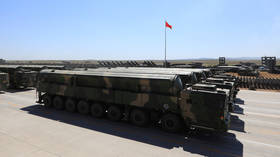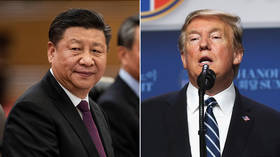Long shot: Germany wants to expand INF treaty to China, after US already buried it

Germany says Russia should get China to join the INF treaty, citing a danger to Russia from Chinese missiles in a last-gasp effort to save the agreement which has already been ditched by the US arms buildup drive.
“Russia must have an interest in involving China in some sort of a disarmament treaty,” German Defense Minister Ursula von der Leyen told Focus Magazine on Sunday. Apparently referring to the 1987 Intermediate-Range Nuclear Forces (INF) Treaty, the minister explained that the Chinese mid-range missiles could technically reach the Russian territory, and said that “just as the Russian missiles are a threat to Europe, so are the Chinese ones for Russia.”
Also on rt.com Top Russian & US generals meet in Vienna for ‘constructive’ talks as Moscow suspends INF dealRussian lawmakers were receptive to the notion – in principle. Aleksandr Sherin, deputy head of the Russian State Duma's Defense Committee said that China, India and other nations possessing intermediate-range weapons should join a framework agreement regulating their possession, development and use. However, he said that claiming a Chinese threat to Russia would need “solid evidence.”
Vladimir Dzhabarov, deputy head of the Senate International Relations Committee, was even more skeptical, dismissing the German minister's statement as “no more than words.”
Also on rt.com Russia suspends INF Treaty with US - Kremlin“The Chinese missiles do not pose any threat to Russia,” Dzhabarov said.
The German minister's sudden concern about Russian security might come as a surprise. However, her motives become much clearer in the context of strained relations between Moscow and the West.
Threat to Europe
The INF Treaty is on its last legs, with Washington announcing its exit a month ago and Moscow following suit on Monday. All dialogue options seem to have been exhausted, with the US still refusing to listen to Russia's arguments and Moscow saying it would stop “knocking on the closed door.”
Russia will immediately respond if US missiles are moved to Europe – Putinhttps://t.co/rXN8mYqLnNpic.twitter.com/dNhHTy66Ar
— RT (@RT_com) 20 февраля 2019 г.
The 1987 agreement banned ground-based missiles with a range between 500km and 5,500km. The arrival time of such a missile usually amounted to between a mere five and seven minutes, leaving the other side almost no time to assess the threat and react. Launched from Russia, such missiles would not reach the US mainland but are capable of hitting any part of the European continent, meaning that Washington’s allies would pay the ultimate price of any dangerous escalation.
Could Europe become a battleground for US & Russia as #INF Treaty gets suspended? pic.twitter.com/b9sfRNqb3v
— RT (@RT_com) 3 февраля 2019 г.
“Mid-range missiles will be a direct threat to all of Europe ... That would be very much of a concern for the Germans. They may talk to Russians about restraint and all that but it is really the US they need to approach and try and change their decision. But the Trump administration is not listening,” former Pentagon official Michael Maloof told RT.
Success unlikely
Even though von der Leyen stopped short of directly calling on Russia to take initiative in dealing with China, her statement suggests she would welcome Moscow doing so. Russia is certainly in a better position to broach the subject than the US.
Washington is currently engaged in a bitter economic dispute with China, exacerbated by the row around the Chinese tech giant Huawei. The US desperately seeks to push Huawei out of the markets of its allies, accusing the Chinese of threatening their security. The EU, as von der Leyen openly admitted, still does not have enough leverage to make Beijing listen to its concerns.
How the US bid to pull out from the Intermediate-Range #Nuclear Forces Treaty will shatter Europe’s security pic.twitter.com/gTRxMc5Fah
— RT (@RT_com) 6 декабря 2018 г.
“The EU cannot do much with Beijing,” Peter Schulze, an international relations expert at the University of Goettingen, told RT. Moscow, on the other hand, is “Beijing's partner” and “can at least make China join the talks about INF,” he added.
Moscow can start pushing Beijing towards a dialogue and it would be a good step.
A major flaw with this plan, however, is that China is extremely unlikely to assent to anyone's requests when it comes to its own security. “Here we have a terrible problem because from 70 to 80 percent of [China's] missile forces … are short- and mid-range ones. They will never give up anything if they do not get something in return,” Schulze said.
China cannot give up their missiles. It is their deterrent, against the US in particular.
A string of US withdrawals from various international treaties, ranging from the Iranian nuclear deal to the INF, would also likely make China less inclined towards accepting any security guarantees from Washington in exchange for de facto disarmament.
Also on rt.com INF Treaty is about European security, not American; US left it to get new missiles – Russian envoyBefore it announced its decision to withdraw from the INF, the US stubbornly accused Russia of violating the treaty while providing no evidence and refusing to listen to any arguments from Moscow. It certainly appears that the current US leadership simply does not want the treaty to stay in place, Maloof believes.
“[US National Security Advisor John] Bolton and others do not want a limit on the US capabilities – they want to be able to arm up,” the former Pentagon official told RT.
Now, what you are going to see is a huge arms race, which will make the world more dangerous.
The notion of challenging Washington apparently never crossed the German minister's mind, while Germany and other NATO allies continue to dutifully follow the US lead, even if it means harming their own security. Instead of hoping that Moscow's and ultimately Beijing's good will would miraculously solve all their problems, Europe and Germany in particular might be better served by trying to push back on Washington’s more belligerent policies.
Subscribe to RT newsletter to get stories the mainstream media won’t tell you.














